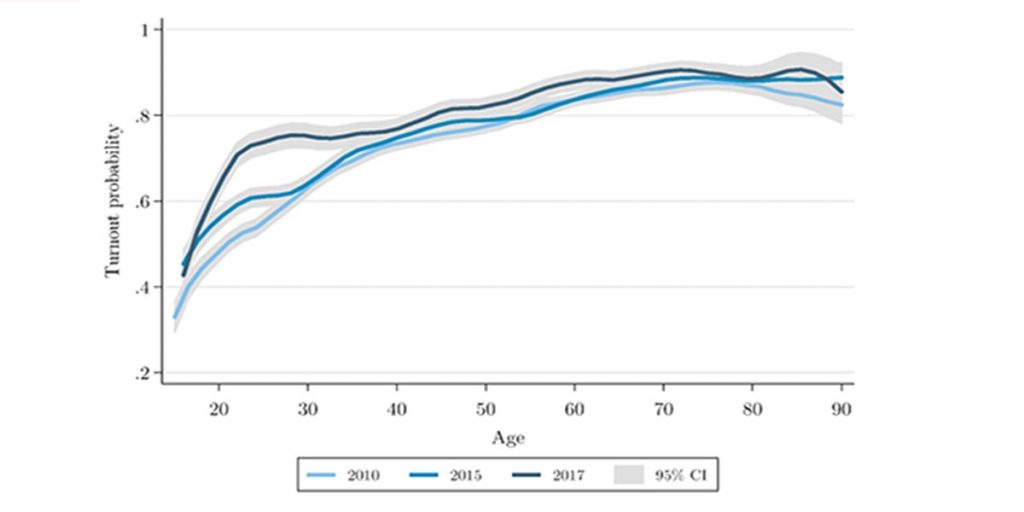Behind the ballot : Volatile Voting
Introduction:
Deconstructing UK voting behaviour is essential to understanding the makings of UK politics and democracy. From the traditional party affiliations to the shift in contemporary political landscape, a range of factors influence how the British population cast their vote at election time. Within this analysis, I delve into the nuances that shape present day voting behaviour, unravelling the hidden dynamics behind increasingly unpredictable electoral outcomes and the volatility in political dialogue.
Brexit
The issue of Brexit has profoundly impacted UK voting behaviour, especially in the reshaping of political alliances and priorities of the public. The 2016 referendum exposed deep divisions within British society, with Leave and Remain camps mobilizing support along the ideological lines of traditional red versus blue politics (Hayton, 2022, p.346). The aftermath of Brexit has seen the emergence of new fault lines in UK politics as influenced by the introduction of euroscepticism to the British public making issues of national identity, sovereignty, and immigration the centre for public discourse and playing more of a role in shaping electoral outcomes instead of the usual socioeconomic factors (Los and McCann et. al., 2017, p.788). Parties that effectively tap into these sentiments stand to gain support from voters who prioritize the specific issue related concerns of Brexit. This tactic was demonstrated by Nigel Farage’s controversial ‘Brexit bus’ campaign which warned against the cost that immigration from the EU brings to Britain. Whilst Farage was fined by the electoral commission for the spreading of false information and figures he ultimately saw benefit from the campaign as he drew in voters disillusioned by the EU and created enough mobilisation to gain support for Brexit and ultimately his party, the Brexit party, catching the votes of the Brexit concerned population (Reid, 2019, p.624).
Presidentialism
Another factor that has influenced voter fragmentation in the UK is the growing sentiment of presidentialism in UK politics, where modern prime ministers are adopting a ‘presidential style’ by concentrating more power towards themselves and addressing the nation as a ‘leader’ (Poguntke, 2000, p.7). Evidence of this phenomenon is seen during the COVID pandemic where national televised coronavirus briefings were conducted with the prime minister Boris Johnson stood between Union Jack flags, speaking from behind a podium in a similar fashion to American presidential briefings. The effect that this has on the British public is that more emphasis is placed on the prime minister as the sovereign leader rather than the rest of the cabinet and parliament and so voters start to look for desirable individual qualities in their leader when it comes to voting choosing based on the ‘candidate’ they resonate with rather than the party. The media also influences the growing sentiment of presidentialism in British politics as news outlets publicise the Prime minister’s life and scandals to influence voters for instance, Tony Blair and his spin doctors, this ‘personalisation’ means the media are also an influencing factor in voter unpredictability (Bevir and Rhodes, 2006, p.674).
Identity politics
Issues related to identity have become more salient than ever in British politics with debates circling immigration, multiculturalism and national identity influencing the way the public vote. Taking this into consideration, political parties to consolidate the vote are abandoning their traditional stances to appeal to the increasingly diverse voter demographics that exist today. This is seen in the 2010 equality act which was passed under the leadership of David Cameron and championed the rights of the LGBTQ+, the disabled, women and others who vulnerable to discrimination in the workplace. Such legislation conflicted with the traditional conservative party beliefs in relation to family values but was introduced by conservative leadership to keep up with changing public priorities (Hayton and McEnhill, 2015, p.135). Another instance of the changing political landscape in relation to identity-based voting would be the 2017 youthquake. The 2017 general election saw the Labour party under the leadership of Jeremy Corbyn gain an unprecedented amount of youth voters, 60% of 18–24-year-olds, due to Corbyn’s vigorous social media campaign targeted at the youth and ethnic minorities based in Urban areas (Sloam and Ehsan et. al., 2018, p.6). This presents how voter behaviour in UK general elections can no longer be predicted through the classic demographics such as class as the public views are no longer so strongly entrenched as shown from the effect of targeted campaigns and legislation.

Conclusion:
UK voting behaviour is categorised by a complex interplay of factors and continues to evolve in line with changing demographics and beliefs that exist within the British electorate. The combination of Brexit, Coronavirus, identity politics and a myriad of other contributors perpetuate the uncertainty that exists amongst modern British voting behaviour which is evident from the inaccuracy of voter polling in recent general elections. For this reason, the analysis of such components is essential to be able to ensure that voter volatility can be mitigated, and voters are led to a more stable political future.
Bibliography
Bevir, M. and Rhodes, R.A., 2006. Prime ministers, presidentialism and Westminster smokescreens. Political Studies, 54(4), pp.671-690.
British Politics and Policy at LSE. (2018). Why 2017 may have witnessed a Youthquake after all. [online] Available at: https://blogs.lse.ac.uk/politicsandpolicy/was-there-a-youthquake-after-all/.
Hayton, R., 2022. Brexit and party change: The Conservatives and Labour at Westminster. International Political Science Review, 43(3), pp.345-358.
Hayton, R. and McEnhill, L., 2015. Cameron’s Conservative Party, social liberalism and social justice. British Politics, 10, pp.131-147.
Los, B., McCann, P., Springford, J. and Thissen, M., 2017. The mismatch between local voting and the local economic consequences of Brexit. Regional studies, 51(5), pp.786-799.
Poguntke, T., 2000, April. The presidentialization of parliamentary democracies: a contradiction in terms. In ECPR Workshop.
Reid, A., 2019. Buses and breaking point: Freedom of expression and the ‘Brexit’campaign. Ethical theory and moral practice, 22, pp.623-637.
Sloam, J., Ehsan, R. and Henn, M., 2018. ‘Youthquake’: How and why young people reshaped the political landscape in 2017. Political Insight, 9(1), pp.4-8.